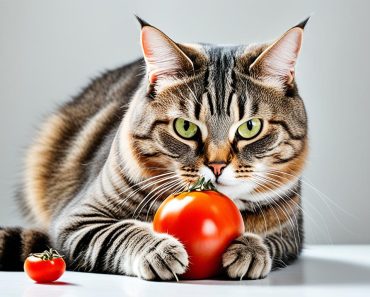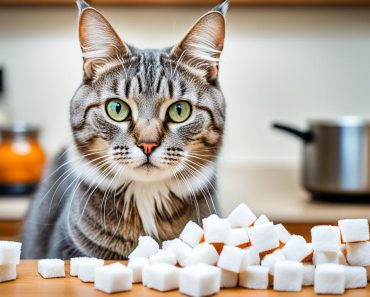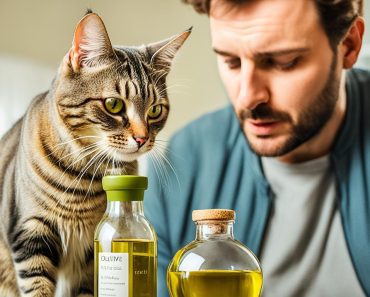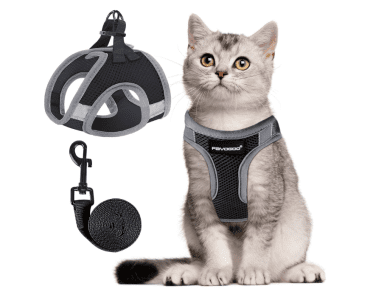Hello, cat lovers! I’m here to answer a common question that many owners ask: Can cats eat raisins? It’s essential to know what foods are safe and healthy for our feline friends to enjoy. In this article, I will explore the dangers of cats eating raisins and provide vital pet health tips to keep your furry companion safe.
Cats are curious creatures, and they may be tempted to snatch a raisin that they come across. However, it’s crucial to understand that raisins are toxic to cats. Even small amounts can lead to severe health issues that can escalate quickly, potentially resulting in kidney failure within 24 hours.
The exact toxic substance in raisins that causes harm to cats is unknown. It’s important to be aware of the symptoms of raisin poisoning in cats, which may include vomiting, diarrhea, abdominal pain, lethargy, loss of appetite, and dehydration. If you suspect that your cat has ingested raisins, immediate veterinary attention is crucial to ensure their well-being.
Can Cats Eat Raisins? Yes, but is safe not to do so.
- Raisins are toxic to cats and can cause severe health issues.
- The exact toxic substance in raisins that harms cats is unknown.
- If your cat ingests raisins, seek immediate veterinary attention.
- Raisin poisoning can lead to kidney failure within 24 hours.
- Symptoms of raisin poisoning in cats include vomiting, diarrhea, abdominal pain, and dehydration.
Why Raisins are Harmful to Cats
The exact toxic substance in raisins that causes harm to cats remains a mystery. However, even small amounts can lead to severe health issues. Cats differ in their sensitivity, so there is no universally safe amount. Raisins can cause kidney failure in cats by damaging their kidneys and hindering their ability to filter blood properly.
The symptoms of raisin poisoning in cats include:
- Vomiting
- Diarrhea
- Abdominal pain
- Lethargy
- Loss of appetite
- Dehydration
If you notice any of these symptoms or suspect your cat has ingested raisins, it is crucial to seek immediate veterinary attention. The harmful effects of raisins on cats can escalate quickly, and early intervention is essential for their well-being.
What to Do If Your Cat Eats Raisins
If you suspect your cat has ingested raisins, it is important to take immediate action and seek veterinary attention. Time is of the essence when it comes to addressing raisin ingestion in cats. The veterinarian will perform a thorough examination to evaluate the situation and determine the necessary course of action for your furry friend’s well-being.
To start, the vet may induce vomiting to remove the raisins from the cat’s stomach. This process helps to eliminate any remaining raisins before they can cause further harm. Additionally, activated charcoal may be administered to absorb any remaining toxins in the digestive system.
However, in severe cases of raisin ingestion and potential raisin poisoning, your cat may need more intensive care. This could involve hospitalization for at least 48 hours, during which the vet will provide intravenous (IV) fluids to flush out toxins and support kidney function. Blood tests and continuous monitoring will be necessary to assess kidney function and ensure your cat’s recovery.
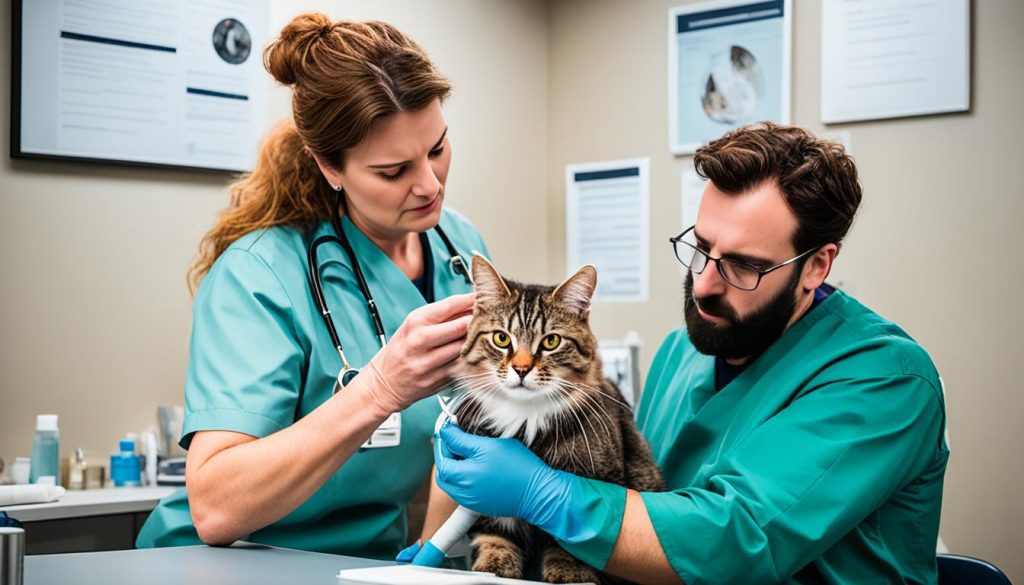
In this critical situation, it’s crucial to trust your veterinarian’s expertise and follow their guidance for your cat’s treatment. Remember, immediate action is key when it comes to raisin ingestion in cats. By taking prompt measures and seeking professional help, you can give your cat the best chance for recovery and prevent any potential complications.
Maintaining a Balanced Diet for Cats
Cats are obligate carnivores, which means their bodies are designed to get energy from protein, not carbohydrates. It is vital to prioritize feline nutrition and ensure that cats receive a balanced diet that is rich in protein, moderate in fat, and minimal in carbs. A protein-rich diet for cats supports their overall health and helps maintain muscle strength.
High-quality cat food should be the foundation of their diet, providing the right balance of nutrients. Look for cat food brands that prioritize real meat as the primary ingredient. Avoid products that contain excessive carbohydrates, fillers, or artificial additives. Read the labels carefully and choose cat food that is specifically formulated to meet their nutritional needs.
Additionally, water is essential for a cat’s health, so always ensure that their water bowl is filled with fresh water. Hydration is crucial for proper digestion, kidney function, and overall well-being.
When it comes to treats and snacks, it’s important to choose cat-friendly options that align with their nutritional requirements. Safe and healthy alternatives to raisins, such as cooked eggs, cantaloupe, and blueberries, can be given in moderation. These treats not only provide variety but also offer additional nutrients that can benefit your cat’s overall health.
Remember, maintaining a balanced diet is key to ensuring the long-term health and well-being of your beloved feline companion. By focusing on feline nutrition and providing a protein-rich diet with minimal carbs, you can help support their overall health and longevity.
Veterinary Care for Cats Who Have Ingested Raisins
If your cat has ingested raisins, it is essential to seek veterinary care immediately to ensure their well-being. When you bring your cat to the vet, they will conduct a thorough examination and assessment to determine the best course of action.
The vet will begin by taking a detailed history, including information about the quantity and time of the raisin ingestion. They will also ask about any symptoms your cat may be experiencing, such as vomiting or diarrhea. This information will help them understand the severity of the situation and guide their treatment plan.
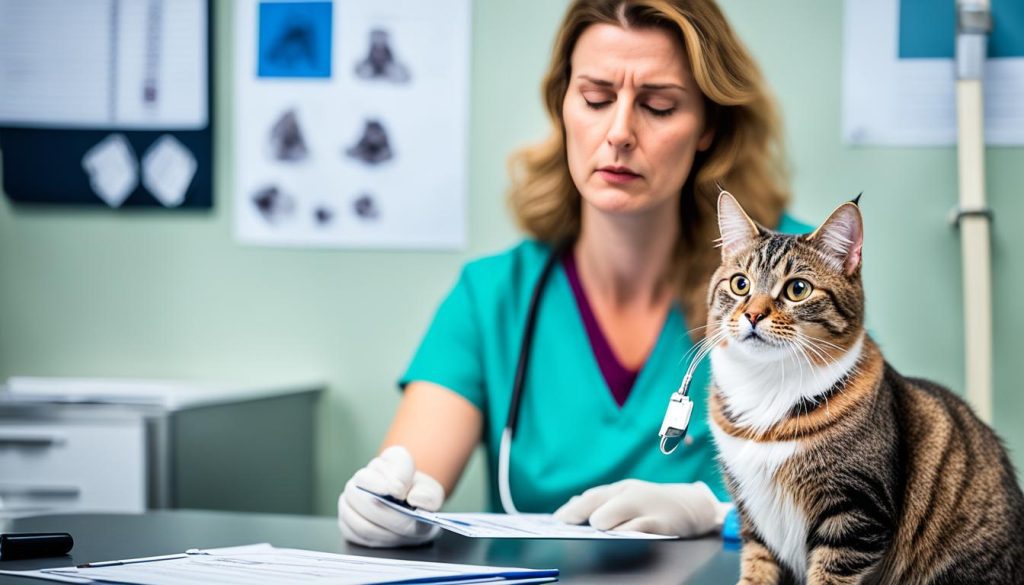
Next, the vet will perform a physical exam to assess your cat’s overall condition. They will check for any signs of dehydration, abdominal pain, or other abnormalities. If necessary, they may also conduct blood tests and urinalysis to evaluate kidney function and check for signs of raisin poisoning.
Based on the assessment, the vet will initiate appropriate treatment for raisin ingestion. This may include inducing vomiting to remove the raisins from the stomach or administering activated charcoal to absorb any remaining toxins. In severe cases, your cat may need to be hospitalized for at least 48 hours and receive intravenous (IV) fluids to flush out toxins and support kidney function.
Throughout the recovery process, regular check-ups and monitoring will be necessary to assess kidney function and ensure your cat’s overall recovery. The vet will guide you on any necessary dietary and lifestyle adjustments to support your cat’s health.
Remember, never attempt to treat raisin ingestion in cats at home without veterinary guidance. Immediate veterinary care is crucial to prevent further complications and ensure the best possible outcome for your furry friend.
Preventing Raisin Ingestion and Other Hazards
To prevent raisin ingestion, it is important to keep raisins out of paw’s reach and educate everyone in the household about foods that are toxic to cats. One simple way to ensure raisins are inaccessible to cats is to store them in high shelves or use cabinet locks. By doing so, you can effectively prevent accidental ingestion and protect your furry friend from potential harm.
Being mindful of all toxic foods for cats is essential in creating a safe environment. Raisins are just one example of a food that can be dangerous to cats. By educating yourself and others about cat-safe foods, you can minimize the risk of accidental ingestion and its potential consequences.
Regularly inspect your surroundings for dropped foods or potential hazards. Cats are curious creatures, and it’s not uncommon for them to investigate and nibble on items they find intriguing. By keeping a vigilant eye and promptly removing any dropped food, you can prevent your cat from getting its paws on something it shouldn’t.
Remember, it’s not just about food. Indoor plants, decorations, and household items can also pose hazards to your cat. Some plants can be poisonous if ingested, while certain decorations or objects may be mistaken for treats. By maintaining a cat-friendly environment and ensuring there are no accessible hazards, you can create a safe and secure space for your feline companion.
- Store raisins in high shelves or use cabinet locks to keep them out of your cat’s reach.
- Educate everyone in the household about toxic foods for cats, including raisins.
- Regularly check for dropped foods and promptly remove them to prevent accidental ingestion.
- Maintain a cat-friendly environment by keeping an eye on indoor plants, decorations, and household items that could be hazardous to cats.
Emergency Situations and Pet Care Preparedness
In case of emergencies such as raisin ingestion, it is crucial to be prepared and have the necessary contacts readily available. Make sure you have your vet’s number saved in a convenient location, such as on your phone or displayed near your pet’s feeding area. Additionally, it’s a good idea to have the contact information for the ASPCA Animal Poison Control Center handy.
In addition to having emergency vet contacts, it’s also important to have a pet-specific first aid kit. This kit should include essential items such as bandages, antiseptic solution, and a pet thermometer. Familiarize yourself with the contents of the kit and how to use them properly.
If your cat ingests raisins or shows signs of toxicity, stay calm and seek immediate professional help. Contact your veterinarian or the ASPCA Animal Poison Control Center for guidance. Acting swiftly can help prevent any serious health issues that may arise from raisin ingestion.
Remember, it’s important to never give your cat any over-the-counter remedies without veterinary guidance. Doing so may exacerbate the situation or cause further harm to your pet.
By being prepared for emergency situations and having the necessary contacts readily available, you can ensure your pet receives the prompt care they need in times of crisis.
Conclusion: Keeping Your Cat Safe and Healthy
It is important to prioritize the safety and health of our feline friends. Raisins, a seemingly harmless and delicious treat for humans, can have serious consequences for cats. To keep our cats safe, it is crucial to prevent raisin ingestion by ensuring they are kept out of paw’s reach and educating everyone in the household about cat-safe foods.
If your cat ingests raisins or shows signs of raisin toxicity, immediate veterinary care is essential. Remember, early intervention is key to preventing serious health issues. Additionally, maintaining a balanced diet for cats, consisting of a protein-rich and low-carb diet, plays a vital role in their overall well-being.
Regular veterinary check-ups should not be overlooked. Preventive care is of utmost importance to catch any potential health problems early and ensure prompt treatment. Being proactive about your cat’s health will go a long way in ensuring they live a happy, healthy, and long life.
By following these simple yet crucial tips and being mindful of your cat’s safety, you can provide them with the love and care they deserve. Remember, a healthy cat is a happy cat!


